Palm Oil
Palm oil is one of the most versatile products on earth. It is also the most used vegetable oil worldwide. Palm Oil is in chocolate, ice cream, cookies, cakes, margarine, pizzas, french-fries, rolls, sauces, ready-made soup, soap, washing powder, cosmetics, shampoo, candles, paintings, laquer, et cetera, et cetera, et cetera... About 50% of the products in the supermarkets contain palm oil. It's also usable as petrol and diesel, so called 'bio fuel'.
Oil Palms
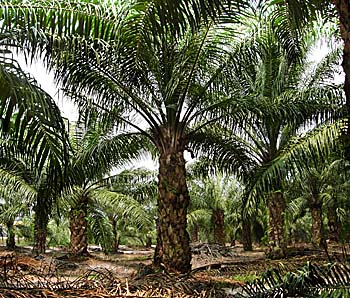
Inside a palm oil plantation near Lumut/Malaysia (close to Pangkor Island). These palm trees were already aged and would in the next years cease to produce fruits. Image by Asienreisender, 2005
The global market for palm oil is booming. In the 24 years between 1990 and 2014 the world production increased by five times. In the next five years until 2020 Indonesia alone is going to double the acreage for palm oil again. To gain new, arable land the tropical rainforests are getting logged and burned in grand style. That's not only an ecological desaster, exposing whole species to extinction. It's also often combined with crimes against local populations, who live since generations in, with and from the forests. Additionally the palm oil economy is responsible for the acceleration of the green house effect. According to the World Wildlife Fund (WWF) globally in every hour an area of the equivalent size of 300 football fields of rainforest is cleared to gain land for palm oil plantations.
The greatest producers of palm oil as the greatest consumers of palm oil products are both located in Asia. Indonesia is the leading country in palm oil production, and together with Malaysia both countries supply almost 90% of the world's demand. In 2012 consumption in India was at 8.4 million tons, 7.5 million tons in Indonesia and 6.3 million tons in China. The 27 member states of the European Union consumed 'only' 5.4 million tons.
Inside a Palm Oil Plantation
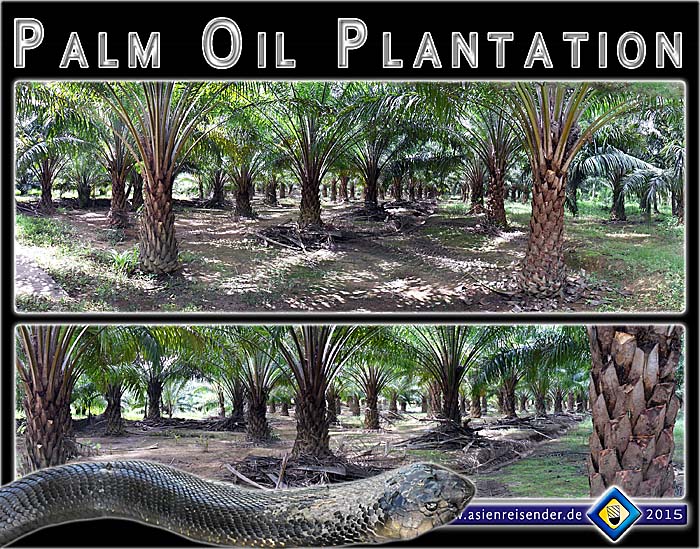
Inside a Palm Oil Plantation on the Malay Peninsula, here Ranong Province, south Thailand. In difference to rubber plantations, the ground of oil palm plantations is usually covered with piles of palm tree leaves. They are a great breeding place for cobras (here a king cobra). Images and photocomposition by Asienreisender, 2012
The Ecological Impact of
Oil Palm Monocultures
Although elaeis guineensis, the oil palm, is of African origin, between 85% and 90% of the today's world production of palm oil is coming from Indonesia and Malaysia. The first trees were brought to Bogor in Java by Dutch merchants in 1848. Since then the palm oil plantations grow and grow and grow ever bigger. In 1980 the world's production of palm oil was at 4.5 million tons. In 2012 it were already 54 million tons. For many years Malaysia was the leading country in palm oil production. In 1985 the Indonesian dictator Suharto made a deal with multinational corporations to boost palm oil production in Indonesia. Large land concessions were given to foreign investors. Great, valuable trees were cut first and sold. The revenues cover the corporate investments for the palm oil plantations. The remaining rainforest is then merely burned, for that is the cheapest and fastest way to prepare the land for the monocultures. Every year now in the dry season the Indonesian forests on Sumatra and Borneo burn, burn, burn. The haze is affecting Singapore, Malaysia and parts of south Thailand. Protests are played down with empty promises of improvement - for next year...
Satellite Map
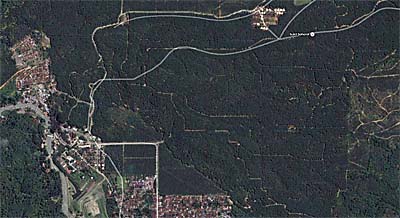
Palm Oil monocultures around Bukit Lawang on Sumatra. Year for year they are growing, approaching closer to the Barisan Mountains into Gunung Leuser National Park. Satellite image from Google Maps, 5/2015
Among the endangered animals, one has to stress that, are so prominent guys like the orangutan, the tiger, the Sumatran rhinoceros as well as countless other mammals, birds, reptiles and insects. Many plants as well. A number of the dying species not even get's scientifically discovered before they extinct.
Oil palms are much more productive and profitable than comparable oil-producing plants like sun flowers, canola or soy. On a hectar land with oil palms the oil production exceeds four tons of oil annually, up to eight tons. Soy, sun flower and canola plants gain about 800 kilograms only.
It's not only that for the expansion of the oil agricultures the native forests burn. By 25% the lowland rainforest's undergound is peat. Peat soil contains 50 times more CO2 than 'usual' soil. It's getting burned and contributes enormously to the greenhouse effect.
Since the lowland forests of Sumatra and the Malay Peninsula are already mostly destroyed and transformed into plantation economies, the further expansion happens now on Borneo (Kalimantan) and Papua.
The new expansion of palm oil production is promoted by the trend to renewable energies in Europe. The industrialized countries don't rely any longer on the exhaustable fossil fuels only. Agro fuel is seen as a (at least partial) replacement. It's to maintain the huge waste the globalized western (capitalist) living style is based on.
Oil Palm Plantations on Sumatra

The Bohorok River on Sumatra, near Bukit Lawang. Left side stretches one of the huge oil palm plantions out. Sumatra's lowland rainforests are practically all transformed into plantation economies. The right side of the river is secondary forest. It's already part of the Gunung Leuser National Park. However, multinational corporations got huge land concessions in the last years to expand into the national park. The habitats of the here living orangutans and Sumatra tigers, together with countless other species, are shrinking every year. Image by Asienreisender, 2009
Healt Impact
Chocolate Bar containing Palm Oil

A 'Twix' chocolate bar. When it comes to sweets and snacks, practically any product in the supermarket contains palm oil. Later, all too often, the packages end up in the green... Image by Asienreisender, 2015
Palm oil is not a healthy food source. The oil consists almost by 50% of saturated fat acids and causes high colesterol and heart diseases. Palm oil also contains substances who are known for causing cancer, particularly as cooking oils. In a 2015 interview which I had with a doctor in Sonja Kill Hospital in Cambodia, the doctor stressed the rise of civilization diseases due to unhealthy food in Cambodia. Palm oil, which is part of a great deal of processed industrial food, is clearly part of the problem. Particularly endangered are children, because the relation of harmfull food ingredients and body weight are crucial.
Corporate Overtake
Corporate Power

The multinational corporations are nowadays more powerful than companies were ever before. Image from an unknown source. I hope not to hurt copyrights by using a low resolution of the work; it's just too fine.
When a great multinational corporation gets a concession, the bulldozers start their work. The most valuable trees get cut, the rest is burned. A roadnet is built then into the area. However, there is the problem with the local population. Usually, corporate agents go into the villages. They organize a party, make the villagers drunk and let them sign a contract. Usually the villagers get deceived and don't understand what's really going on. Some don't agree. They get either bribed or intimidated. If a community as a whole resists, security agencies, police and military get deployed to push the corporations 'legal rights' through. Land grabbing practices are usually brutal. In Cambodia the English papers are often reporting about such cases, and the practices of the land grabbers, covered by the government and (often corrupt) officials, are often very brutal and murderous. In the Indonesian 'democracy' it doesn't look any better. At the end the traditional village community is torn appart, disrooted, impoverished. The social structure is destroyed, there is no or little financial compensation for the loss and they have practically no future. They join the growing masses of slum squatters in the ugly megacities. Few find lousily paid jobs in the plantations, barely enough for mere survival. Plantation managers like to call that a win-win-situtation. The forests therefore, before a rich source for meat, fruit, mushrooms, bamboo, wood, roots and more, are gone forever. The landscapes changed dramatically into a green desert.
Working Conditions
Work in the plantations is lavish. On the Indonesian plantations alone are three million people working. And the plantation work is not without danger. On the contrary to rubber plantations, where the ground is usually pretty clean, the oil palm trees loose frequently big leaves. These leaves cover the ground, make it partially impassable and provide a favourable habitate for snakes, centipedes, scorpions. Cobras like to live here. Since the workers have to go into the plantations at nighttime, encounters with the noctornal snakes happen.
Additionally to the regular workers, who make only 50% of the total workforce, there are contract workers employed. They are often (working) immigrants from neighbouring or other countries and have usually no legal protection and no proper contract. Their working conditions are often compared with slavery. To fullfill the high work load their children and women have to help them. They have to use pesticides but get not equipped with protecting clothing. The payment is miserable. In long-term it even dropped. While a plantation worker in 1937 got the equivalent of 4.37kg rice plus social benefits like a pension, in 2007 payment dropped to the equivalent of 3.7kg rice without any gratification. It's apparently a worldwide tendency that labour get's devaluated.
Sustainable Palm Oil Production
To face the problems of deforestation, land grabbing and climate change, the 'Roundtable on Sustainable Palm Oil' (RSPO) has been founded in Zurich/Switzerland in 2004. The organization, which has among his 800 members so different organizations as the World Wildlife Fund (WWF), the Swiss corporation Migros, banks, oil mill companies and others who are in the palm oil business, claims to promote sustainable palm oil production to contain environmental damage. The RSPO developed until 2005 32 different criteria for the production of 'sustainable palm oil'. Based on that they created a certification for 'sustainable palm oil'.
Oil Palm Fruit
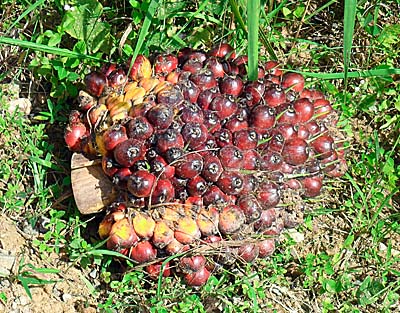
The reddish colour of the palm fruit comes from the high percentage of beta-carotene content - it's very rich in vitamine A. Image by Asienreisender, Chumpon Province, Thailand, 2012
However, since 2008, when the first load of RSPO certified palm oil arrived in the port of Rotterdam, critics didn't cease on the organization. Greenpeace, Robin Wood, Rainforest Rescue call the certification 'green washing'. The RSPO criteria are weak and no sanctions for violaters are implemented. A producer can get a certification for running a 'pattern plantation', while he hurts human rights and ecological standards on his other plantations. Workers right's are not satisfactorily protected and rainforest is still getting destroyed. Plantations can still be founded on sensitive peat grounds, highly toxical pesticides are still allowed. And more basically: gigantic palm oil plantations as monocultures can generally not be 'sustainable'. These plantations always base on deforestation, mass-extinction of species, floods, draughts, soil erosion, water pollution and the exploitation of workers.
Besides do the plantation products compete with other crops, particularly food. Food prizes rise. Rice get's expensive; Indonesia is a country which has to import rice meanwhile. Fruits and vegetables are getting expensive, because the plantations cover all the land and there is little left for food production. Not to mention meat. The water is heavily polluted with pesticides. The water crisis is threatening the few remaining animals, and the people have to buy very expensive bottled drinking water. Even palm oil for cooking get's increasingly expensive, because the world market drives the prices up so that the local populations can barely affort it. The pressure on food prizes rises with draughts and bad harvests due to the climate change. In the countries which suffer most under land-grabbing practices the starving part of the population is mostly bigger than elsewhere.
There is no 'sustainable' palm oil production, and there is no ecological fuel. Any plantation is the result of deforestation. And social standards are kept down everywhere - capitalistic production is always based on the exploitation of labour and nature. All this green-labeling is nothing but fraud.
Environmentalists and human rights activists are frequently blamed for damaging the national economy or harming national unity. They get defamed, persecuted, intimidated, banned, deported and sometimes killed. Those who extremely harm the nature and human rights for short-term profits therefore are usually promoted by states, laws and violent forces like police and army.
Endless Monocultures on the Malay Peninsula
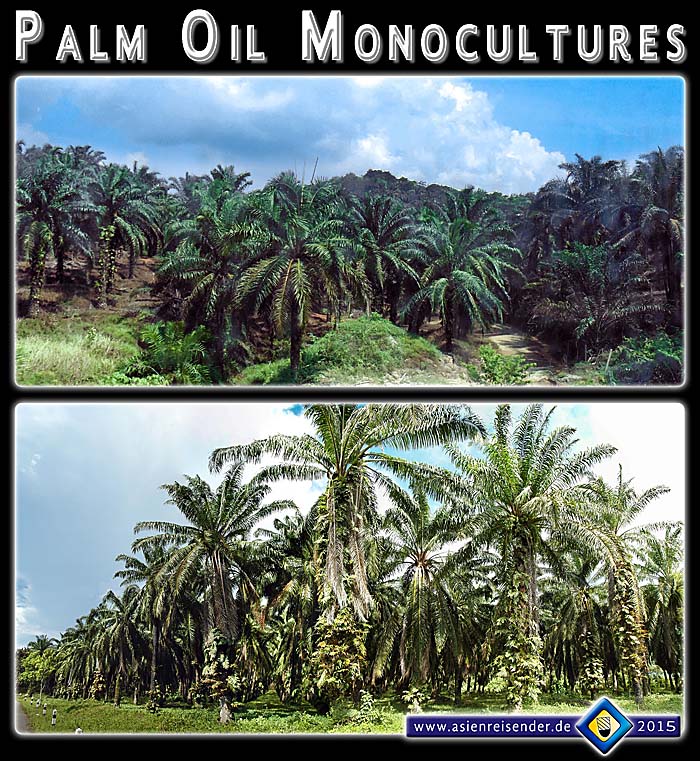
After leaving Kuala Lumpur / Malaysia, the landscapes look over wide parts as to see on the upper photo, shot through a bus window. The whole Malay Peninsula is coined by plantation monocultures. Many hundred kilometers north, in Trang Province / Thailand, it looks still similar. Images and photocomposition by Asienreisender, 2012, 2015